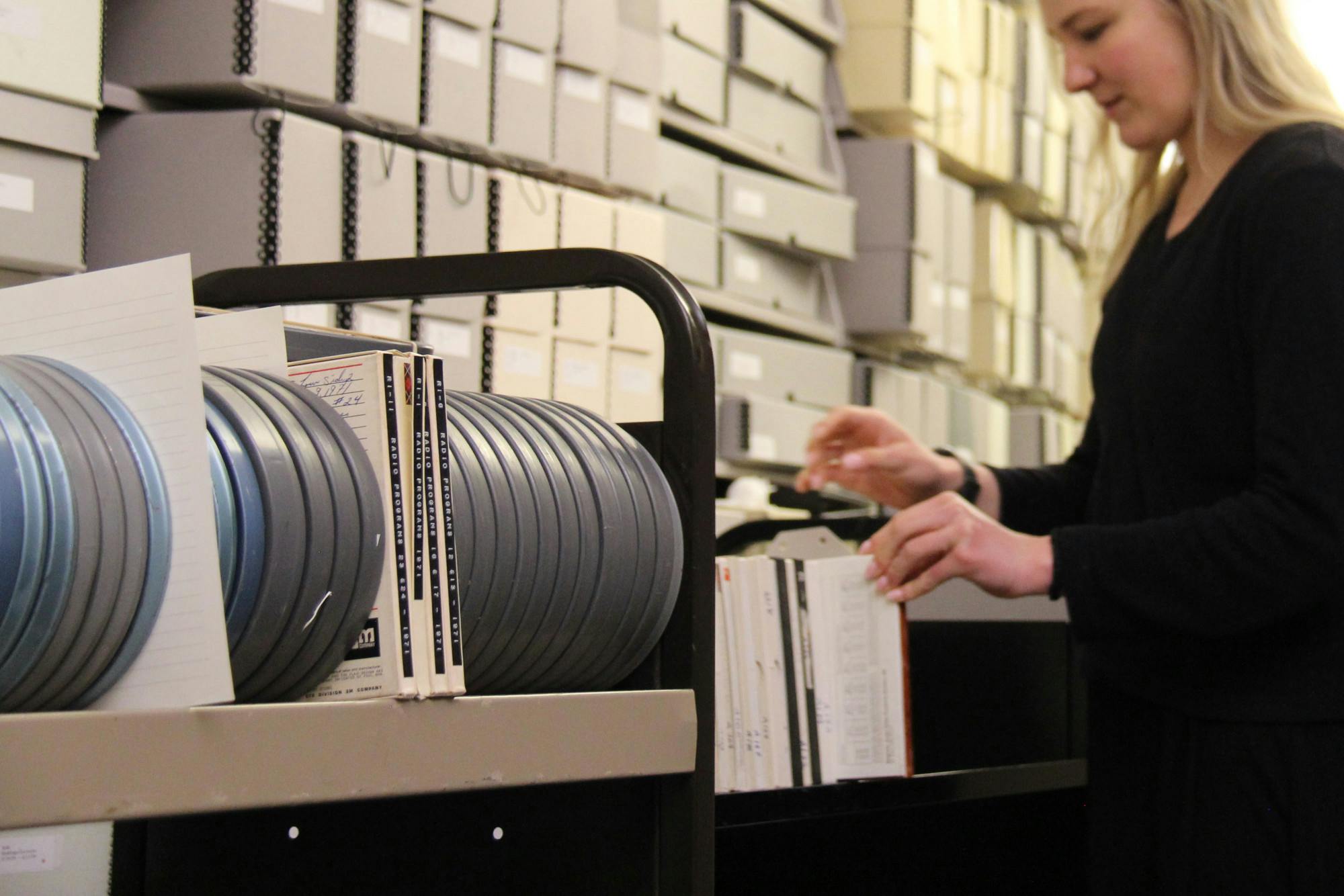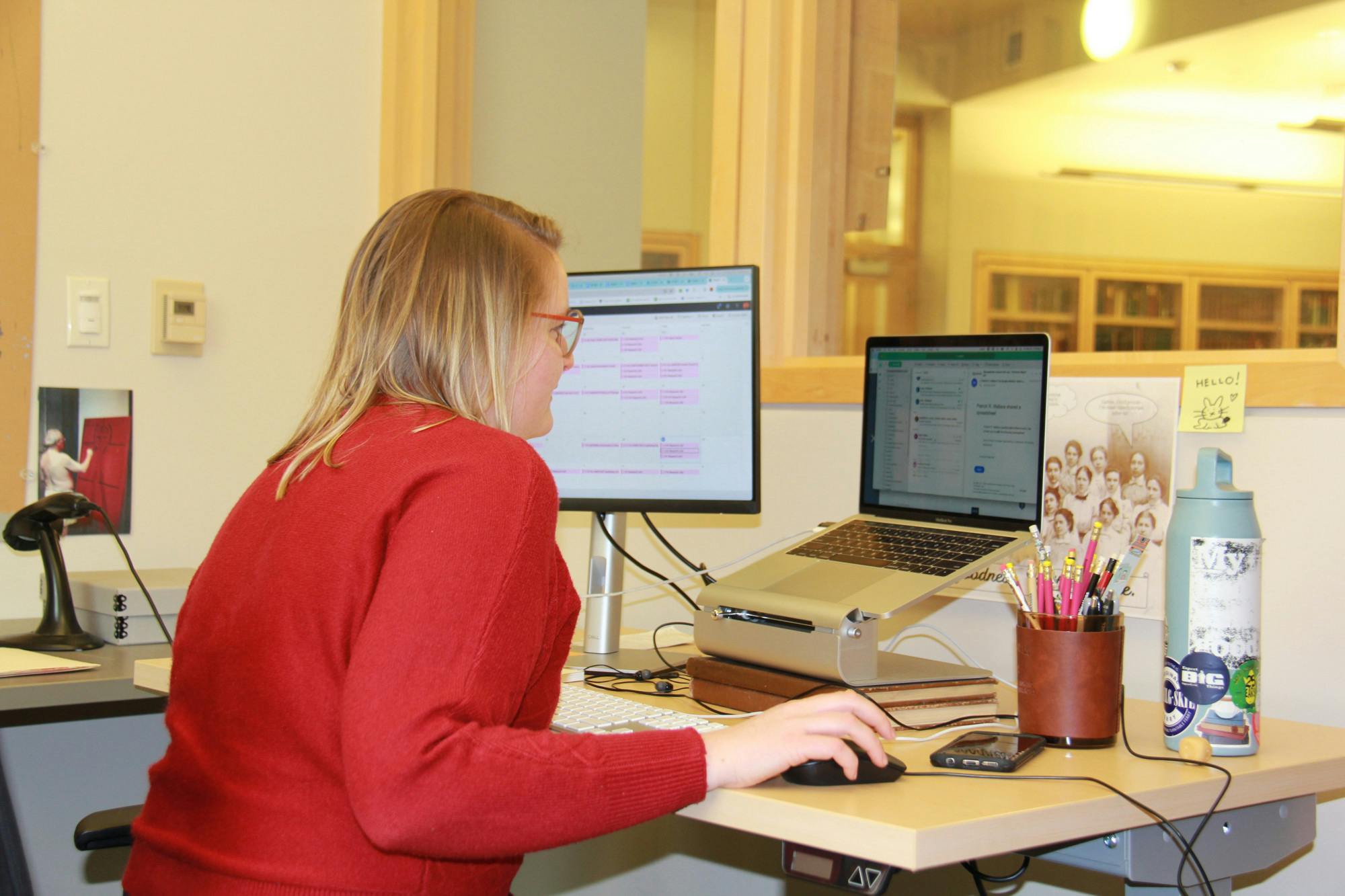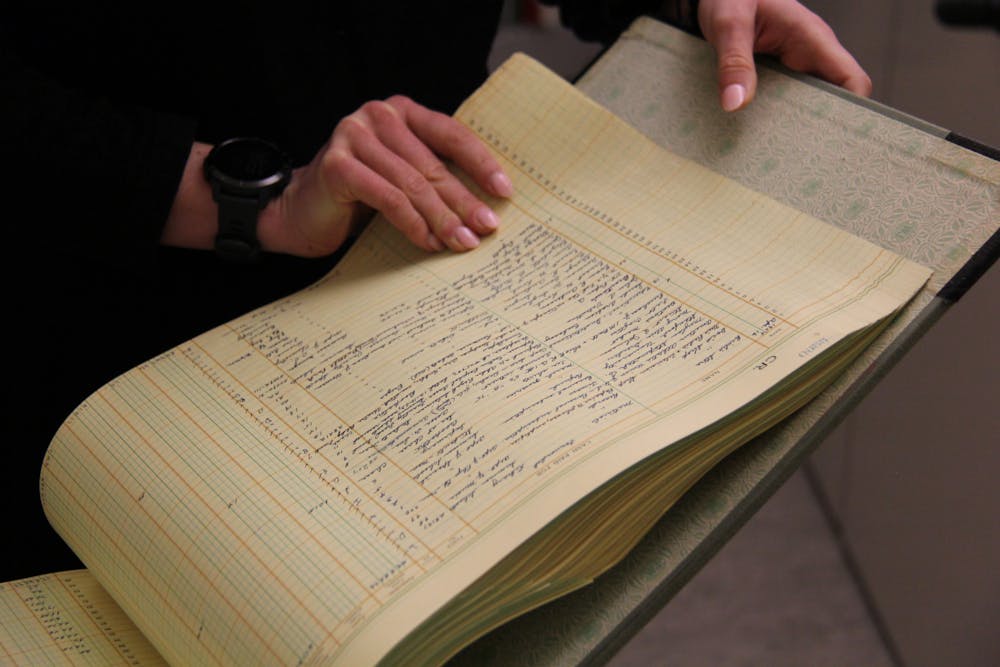The Special Collections Reading Room is, by design, a quiet space. Researchers pore over the college’s archives, marking discoveries in an excited, hush tone only possible in a library. The space — frequented by college students and varied visitors — is marked by a single glass door as the threshold of the archives, the protective line between public and private areas in the collection.
Beyond that door, however, lies the heart of Special Collections.
Walking into the college archives, you immediately encounter a hub of unexpected activity. Student interns buzz around the stacks, collecting materials for their personal collections and playing a scavenger hunt with an old fake mouse. Joseph Watson, preservation manager and archives association, pulls a copy of a beat-up blue-bound book, weighing whether it needs a touch-up in the conservation room. College Archivist Kaitlin Buerge ’13 walks back between the stacks, answering intern questions and navigating carts piled with materials to be used for class visits.
Among it all is towering shelves, lined with the treasures of the college.
Mosque lamps from Saudi Arabia. Original Emily Dickinson poems. WRMC tapes from the 1970s. All of this lives back there, below the Davis Atrium and Crossroads Cafe, and all of it is carefully overseen by the staff of Special Collections for current and future use.
“We are the memory of libraries. We stay here to tell students why this matters, and that books in a physical format still teach us something,” said Rebekah Irwin, director and curator of Special Collections.
Irwin and the other staff are familiar with the eclectic mix of items in their collection, but no one can know everything about the college’s vast repository of its history.
“We have a good grasp of what's back there, but not every individual piece of paper is described, for example,” Buerge explained. “Someday we'll find a letter and be like, ‘Oh, we didn't know this was in here talking about this specific thing.’ And so that's always really exciting.”
“We learn things from our researchers all the time, who are specializing in one area and have the time to come and really engage,” added Special Collections Public Services and Outreach Specialist Mikaela Taylor ’15.
In addition to the discoveries made in the current archives, Special Collections are actively curating new items and documents to add to their collections. Often scheduled class visits and sit-downs with faculty will lead to newly acquired items carefully stacked on designated shelves, waiting to be used for the first time as tools of instruction.
One of the collection’s most exciting new acquisitions was a donation of over 300 tapes from WRMC from the 1970s. Featuring old Middlebury radio shows, student debates and possibly pirated content with astrology-themed covers, the files currently live in their boxes until the staff find an outside vendor to digitize them and make them accessible to new listeners.

The staff all rely on each other to understand the archives, sometimes working across generations to identify the relics of past students and faculty who used VHS, cassette tapes and other once-innovative methods for recording information
“On any given day, each of us stumbles upon some old format,” Irwin added. “Remember, Kaitlin, you came into my office one day and you were like, ‘What is this?’”
The mysterious item in question turned out to be a Betamax, a clunkier, less useful relic of the 1970s that was hidden away on a shelf somewhere until Buerge pulled it into the daylight.
“As a child of the 90s I knew it wasn’t a VHS tape, but I wasn't really sure what it was,” Buerge responded. “It's not uncommon for me to encounter something that I've never seen before and be like, ‘What is this?’ And then Rebekah says, ‘It's a Betamax.’”

A major part of Special Collections is educational opportunities, with classes and their students dropping by the Reading Room on a regular basis to look at materials tailored to courses ranging from economics to American studies. The staff here organized over a hundred workshops last academic year, with 2176 students descending to Davis’s lower level for carefully curated sessions in the reading room, according to data collected by Taylor. The number of visitors to their collections has skyrocketed in recent years in the wake of Covid-19; the staff saw an increase in visitors of 324% in 2021-2022 compared to the previous year, with a more modest 13% increase in 2022-2023.
“In a typical week for us, we're definitely seeing more classes than your average faculty sees, classes that we're preparing for and seeing come through the doors,” Irwin said with a laugh.
Special Collections’ focus on education is a unique feature of an institutional archive, which prides itself on easy access to rare archival materials — vintage film, animal-skin manuscripts from the 15th century and decades-old oral histories — for the many undergraduates who pass through.

“The only reason we have all the other collections outside of the [college] archives is to use them as an educational tool,” Watson explained, adding they want the resources to be used carefully as tools to educate about the importance of physical media.
Many professors are what they call “archival rockstars” and “frequent fliers” in Special Collections, perennial visitors with their classes who love to engage in the archives and know exactly what they want to focus on.
“But there are many other faculty members who really trust us,” Irwin explained. “I sat down and had an hour-long conversation with one faculty member, but she said, ‘I trust you. You are the experts in your collection.’”
Watson explained the latter relationship more bluntly: “Sometimes professors will just say, ‘This is my class. Do it.’ But other times they're very collaborative.”
Taylor has also worked with many groups on campus and in the local community to invite more people into the archives. Recent events include visits from k-12 student groups, senior citizens and student clubs such as the Black Student Union, who held an event last semester organized with Taylor for alumni and current students of color to view records of their organization.
“It can be a community through time,” she explained. “We’re able to interact with a wider variety of people and see insights from a diverse array of perspectives, rather than just the scholars.”
Buerge added that Special Collections is a way for students to be able to connect with the history of their student organizations and students who came before them. Another recent addition to the archives came from a member of Alianza, who deposited a number of flyers and photographs from their club’s history to the archives.
“We don't see every bulletin board or every dorm, or by any means, every social media feed that comes through. So some of that we only learn from students who choose to tell us,” Irwin said.
The vast size of the ever-growing archives means that the staff must continue to prioritize which materials are collected, brought out and repaired when damaged.
“We have many books in the back that are falling apart, but if they're not being used, they are not our priority when it comes to fixing them,” Watson said.
Even the slow loss of materials and degradation of book spines — ideas which might wake other archivists at 3 a.m. in a cold sweat — can be an important lesson for those who visit Special Collections.
“Sometimes the books that are falling apart then become a teaching tool in themselves, because they can show how a book breaks down over time, how materials were put together,” Taylor said.
For the books that require attention — both from the archives and from the library’s circulation — Watson intervenes, bringing them to the preservation and conservation room down the hall. By carefully unwrapping strings that hold unbound book covers together or adding weights to allow glue to dry evenly on a spine, he continues a cycle of renewal essential to future students appreciating the collection.
For Special Collections’ most precious and difficult repair jobs, Watson will send the items to a specially trained conservator. This year he has taken over much of the repair work after another staff member retired, and hopes to continue learning specialized techniques to enhance his craft.

With his work — and the efforts of Taylor, Irwin, Buerge and all who came before them — comes a quiet dignity. At the heart of Special Collections is an assertion of the importance of the physical spaces, of preserving knowledge for future use and of marking meaning in any shape it comes. In recent years the archive has developed digital tools to mirror the college’s shift online, where controversies and crucial updates are constantly relayed, a space in which Digital Projects & Archives Librarian Patrick Wallace works.
“We’ll often say that the history of the college is up to five minutes ago when something happened or Laurie Patton sends out the most recent email,” Irwin said, adding that the archives are a continuous, living space for everything that happens here, even what is online. That ability to adapt and remain relevant is a testament to the commitment of the Special Collections team.
“If there were any kind of resource on this campus that was empty, filled with things unused by students, I think someone on this campus and the administration might wonder what is the value of this unused space or these unused collections,” Irwin said. “Luckily, we can all say for the time we've been here, that’s not been the case.”

Even if a student only comes to the archives once in their four years here for a distribution requirement class, the staff hopes to leave with the student a lasting appreciation for the physical world in an age that in some respects has left the physical, the paper, behind.
“At least they’ll come and then they’ll leave, maybe thinking, ‘Oh, this matters,’” Irwin explained.

Ryan McElroy '25 (he/him) is the Editor in Chief.
Ryan has previously served as a Managing Editor, News Editor and Staff Writer. He is majoring in history with a minor in art history. Outside of The Campus, he is co-captain of Middlebury Mock Trial and previously worked as Head Advising Fellow for Matriculate and a research assistant in the History department. Last summer Ryan interned as a global risk analyst at a bank in Charlotte, North Carolina.




